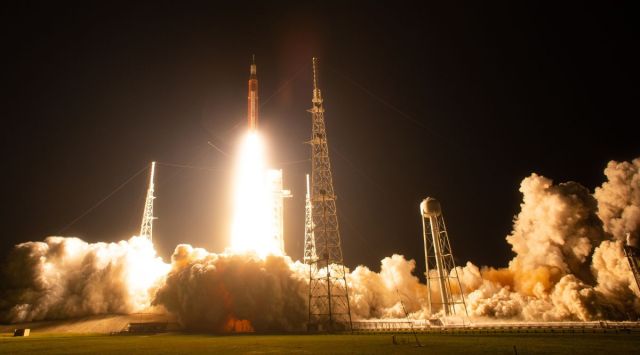SLS rocket programme ‘unaffordable’, NASA unable to estimate real cost: Report
According to a new report to the United States Congress, NASA officials admitted that the space agency's SLS rocket program is "unaffordable."
 NASA's SLS rocket launching from Cape Canaveral for the Artemis 1 test mission. (NASA)
NASA's SLS rocket launching from Cape Canaveral for the Artemis 1 test mission. (NASA) A report to the United States Congress by the country’s Government Accountability Office (GAO) says the National Aeronautics and Space Administration (NASA) lacks transparency on the costs of its Space Launch System (SLS) rocket programme, which is being developed for the Artemis Moon programme.
Interestingly, according to the report published by GAO on Thursday, NASA officials admitted that at current cost levels, the “SLS programme is unaffordable.” The report states that the American space agency is working on improving affordability but adds that it is too early to assess the effects of those actions on future costs.
 The SLS programme is crucial to the space agency’s plans to send humanity back to the Moon with the Artemis programme. The launch vehicle was already tested with the uncrewed Artemis 1 mission and will also be used at least up to Artemis 5.
The SLS programme is crucial to the space agency’s plans to send humanity back to the Moon with the Artemis programme. The launch vehicle was already tested with the uncrewed Artemis 1 mission and will also be used at least up to Artemis 5.
“With input from NASA management, the SLS programme has developed a roadmap outlining short-term and long-term strategies that it hopes will result in future cost savings,” said the report. These efforts will include strategies to stabilise the rocket’s flight schedule, achieve learning curve efficiencies and adjust acquisition strategies.
Difficult to understand the true costsscien
The report states that the cost and schedule commitments of the original SLS rocket were tied to the launch of Artemis 1. This meant that ongoing production and other costs needed to sustain the programme going forward were not monitored. Instead, the space agency created a rolling 5-year estimate of production and operation costs. This ensured that the costs fit within the space agency’s overall budget.
But since neither the annual budget nor the estimate track costs by Artemis missions or for recurring production items, the estimates and budget requests were deemed as poor measures of cost performance over time by GAO.
There is also no way for the cost estimates to account for delays that could happen to the Artemis programme, according to ARS Technica. It is unlikely that the first crewed mission of the programme, Artemis 2, will launch before 2025. This means that the Artemis 3 mission will probably only take off in 2026, according to the publication. The missions were initially planned to be launched in 2025 and 2026 respectively.
Attempts to reduce costs
One of the most important ways in which NASA will attempt to reduce costs is by stabilising the flight schedule. The report found that changing aspects of the flight plans like dates, planned modifications and mission objectives, increased costs and changed schedules for the program. Repeated changes to all of this contribute to uncertainty and hamper the agency’s efforts to make plans effectively. The space agency will try to stabilise the flight plans for the SLS rocket during Artemis missions to cut down on costs.
Another crucial method to reduce costs could be a change to the agency’s contract acquisition strategies. NASA’s primary method of awarding contracts uses a cost plus award fee strategy where manufacturers are paid the actual costs they incurred for the completed work and an extra fee for their performance. The agency is working on shifting to fixed-price contract types where they pay contractors a fixed fee. This can shift costs and risks from NASA to the contractors.
Apart from that, the agency will also be looking to reduce costs by taking advantage of economies of scale for mass-produced components as well as innovation in manufacturing techniques.
It still remains to be seen whether all of this can actually help NASA to cut down on costs. CNN reports that the space agency has a poor track record with managing the costs of the SLS programme. The report states how both the GAO and NASA’s Inspector General have raised concerns about the programme going as far back as 2014.







